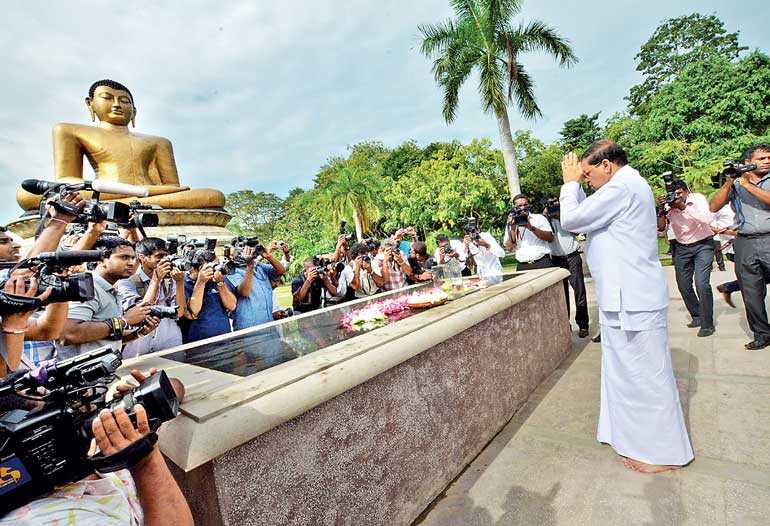Sunday Feb 15, 2026
Sunday Feb 15, 2026
Saturday, 9 February 2019 00:10 - - {{hitsCtrl.values.hits}}

President Maithripala Sirisena has been talking quite extensively about reintroducing capital punishment, upon arriving after an official visit from the Philippines, which has adopted drastic measures to combat the menace. There appears to be some kind of a public outcry in predominantly-Buddhist Sri Lanka to the idea of lifting the 43-year-old moratorium on capital punishment – Pic by Shehan Gunasekara
 President Maithripala Sirisena sounds adamant and seems to have taken a couple of strides towards making capital punishment law in the country. He has been talking quite extensively about reintroducing capital punishment. Is this the right way forward? At least is it the correct way of arriving at critical and important decisions? In spasms?
President Maithripala Sirisena sounds adamant and seems to have taken a couple of strides towards making capital punishment law in the country. He has been talking quite extensively about reintroducing capital punishment. Is this the right way forward? At least is it the correct way of arriving at critical and important decisions? In spasms?
Upon arriving after an official visit from another country which has adopted drastic measures to combat the menace, the President is on high octane, an ardent adherent now of the splashy Philippine President Rodrigo Roa Duterte, the man who led thousands of extrajudicial killings in that country. There appears to be some kind of a public outcry in the predominantly Buddhist country to the idea of lifting the 43-year-old moratorium on capital punishment. In the same breath it must be stated drug related crime is also on the rise.
Shootings, blood meandering over macadamised asphalts, dead bodies lying still are no longer scenes exclusive to South America. It’s becoming very common in Sri Lanka as well. Funerals of youth, extremely sad events. Both victims of abuse and victims of gang violence. Sights of bereaved inconsolably sobbing, quite unbearable. Families often unaware of victims’ involvement in the nefarious activity until the dreaded knock on the door or phone call.
The idea of capital punishment had come up for national discourse many times before but there was no political will to go through with it. Are we getting ready for another stint of pure, unalloyed drama in technologically-loaded, ambience-laden, colourfully-lit theatres to appease constituencies in an election year or is it genuine, sincere outpouring against the devastation drugs have caused in contemporary Sri Lanka? An action is certainly decided by its intention.
At present lack of clarity looms and ambiguity rules. It’s just the emperor strutting and fretting like an uncertain protagonist, justifiably consumed. Sputtering incoherently as if in a quandary-laden soliloquy usually captured in medieval thespian art.
Sarcophagus politics, such a potent weapon for Sri Lankan politics and politicians. They use it quite regularly and to good effect too with meticulous usage of calculus. Their wizardry and mastery second to none. Would exhume a body or preserve a fugitive languishing within or peregrinating the world indefinitely until dominion and some semblance of immunity is achieved. This is the newly-visible classic of Sri Lankan politics, quite antithetical to all norms of decency and democracy.
Public cynicism on the issue contagious. It was Martin Luther King who famously said: “Injustice anywhere is a threat to justice everywhere.” If by way of reintroducing capital punishment some political mileage or any other political benefit is sought, let’s put a stop right away. On the contrary if it’s genuine, let’s do it with courage and conviction. What’s at stake are human lives.
Sri Lanka last executed a prisoner in 1976. At the time, prisoners were hanged. The media speculates if Presidential decree is granted, Sri Lanka will start executing prisoners with drug trafficking convictions who are on death row. Local media estimates there are just under 1,500 people in prison facing face death sentences and 48 of them have been convicted of drug offences. Only 18 of those convicted of death penalty eligible drug offences are on death row because the remaining 30 have appealed their sentences.
A March 2018 report by Harm Reduction International says: «There are at least 33 countries and territories that prescribe the death penalty for drug offences in law. Capital punishment is the practice of executing individuals as punishment for a specific crime after a proper legal trial. The key is to have a free and fair trial. China executes the most people per year overall, with an estimated figure of 1,718 in 2008. Amnesty International also states that in 2008 Iran executed at least 346 people, the USA 111, Saudi Arabia 102 and Pakistan 36.
Sale of drugs in Saudi Arabia, a predominantly Muslim country, almost always results in the death penalty. The judicial system is not inclined to make exceptions. Alcohol use too is illegal there. Possession or use of alcohol can be punished by public flogging, fines, and lengthy imprisonment. In Vietnam and Thailand where there is a strong Buddhist tradition, drug crimes are taken very seriously. If you are arrested with more than 1.3 pounds of heroin in Vietnam, you will automatically be executed. In Thailand, those trafficking narcotics may be put to death and drug users are frequently sentenced to mandatory rehab. The Philippines, a Christian country all over the news at present, has initiated a rather strong response with graphic consequences.
Donald Trump too has been upping the rhetoric. “We’re wasting our time if we don’t get tough with drug dealers, and that toughness includes the death penalty,” said Trump in typically combative style. He also added: “The ultimate penalty has to be the death penalty. Maybe our country is not ready for that, it’s possible, it’s possible.” Trump said “personally I can’t understand that” about those opposed to such drastic measures.
The time is most opportune to take the right decision. A bipartisan approach is the best. It’s precious human lives we are talking about.